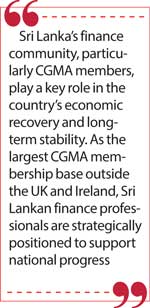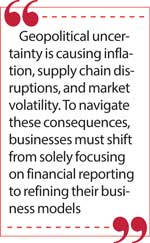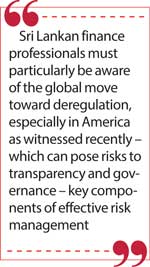Thursday Feb 26, 2026
Thursday Feb 26, 2026
Friday, 28 March 2025 00:02 - - {{hitsCtrl.values.hits}}

CIMA President Simon Bittlestone
The Chartered Institute of Management Accountants (CIMA) President Simon Bittlestone is the 91st CIMA President and 9th Chair of the Association of International Certified Professional Accountants, representing AICPA and CIMA.
Simon is a business leader with experience in both private and public companies and in the US, UK, and Asian markets, and currently holds a portfolio of advisory and non-executive roles for several technology businesses, investment funds, and charities.
He became a CIMA member in 2009 and was admitted to fellowship in 2016 and has been an active ambassador and supporter of CIMA over the last decade. He was a member of CIMA’s Audit and Finance Committee in 2016-17 before being co-opted to CIMA Council in 2018. In 2021, he was appointed to the Association’s Board of Directors and Audit and Finance Committee and has previously served on CIMA’s Thought Leadership and Business Ethics Committee. In this interview with the Daily FT, the CIMA President discusses today’s global economic landscape as well as sharing insights into how the accounting profession can be utilised to aid long-term economic stability.
 By Janani Kandaramage
By Janani Kandaramage
Q: As CIMA’s President, how do you see Sri Lanka’s financial professionals contributing to the country’s economic recovery and long-term stability?
A: Sri Lanka’s finance community, particularly CGMA members, play a key role in the country’s economic recovery and long-term stability. As the largest CGMA membership base outside the UK and Ireland, Sri Lankan finance professionals are strategically positioned to support national progress.
Two key areas where they contribute are governance and growth. The government has prioritised enhancing transparency and tackling corruption, and finance professionals are integral to this effort by upholding strong governance standards in businesses. The foundation for CIMA professionals is ethics, and they include integrity, accountability, diligence, and objectivity to name a few.
Beyond governance, finance professionals (particularly management accountants) drive strategic decision-making that fuels economic growth. They provide critical insights for businesses on capital investment, expansion strategies, and foreign direct investment-ensuring sustainable development. By equipping businesses and policymakers with the right data on budget, forecasts, and cost analyses in addition to financial strategies, they will help shape a resilient and growth-oriented economy.
Q: What can Sri Lanka’s finance sector learn from global trends in risk management and financial resilience?
A: Sri Lankans can learn the importance of a robust emphasis on risk management, starting with accuracy in accounting. Building a solid business model is vital, enabling rapid responsiveness to evolving challenges and recognising specific trends. The business model involves identifying and analysing trends and potential business/finance related risks, envisioning future possibilities and informed decision making. While it’s impossible to anticipate every future event, this sense of preparedness and adaptability are key to ensuring resilience against challenges.
In addition, management accountants play a pivotal role in navigating various kinds of risk, with a growing focus on technology-related threats such as cybersecurity and those posed by Gen AI. Continuous learning of these threats and increasingly adopting new technologies to oversee dubious activities will empower the sector to combat escalating cybersecurity risks. Technological integration, I believe, must be increasingly leveraged across all forms of businesses including State-owned Enterprises (SOEs).
 The evolution of the finance function also implies the need for a broader skill set. While traditional technical accounting expertise remains important, there is a shift toward cultivating leadership, communication, and hands on skills. Future finance professionals should embody a T-shaped profile, combining deep knowledge of accounting with a broader understanding of business dynamics.
The evolution of the finance function also implies the need for a broader skill set. While traditional technical accounting expertise remains important, there is a shift toward cultivating leadership, communication, and hands on skills. Future finance professionals should embody a T-shaped profile, combining deep knowledge of accounting with a broader understanding of business dynamics.
Q: Speaking about cybersecurity threats, the regulatory landscape is evolving rapidly. What trends in particular must Sri Lankan finance professionals be cautious of?
A: Sri Lankan finance professionals must particularly be aware of the global move toward deregulation, especially in America as witnessed recently – which can pose risks to transparency and governance – key components of effective risk management. While free markets are beneficial, it’s essential to notice the significant role that regulations play in maintaining standards, and therefore the need for a balance between the two.
In terms of cybersecurity, there are emerging trends in technology regulation, especially concerning generative AI and cybersecurity. As emphasised earlier, the anticipated increase in regulation in these areas underscores the need for finance professionals to understand associated risks and stay informed about relevant regulations via continuous learning to all professionals regardless of their position.
Q: What impact is geopolitical uncertainty having on global financial markets and how should businesses prepare?
A: Geopolitical uncertainty is causing inflation, supply chain disruptions, and market volatility. To navigate these consequences, businesses must shift from solely focusing on financial reporting to refining their business models-identifying even key non-financial indicators such as market trends and demand shifts, not just financial data. By analysing how these factors drive financial outcomes, companies can anticipate risks and respond proactively, ensuring resilience in an unpredictable global business environment.
Q: In the context of Sri Lanka’s volatile economic conditions, how can local businesses build financial resilience to combat local challenges?
A: Sri Lanka’s economic landscape remains volatile, but there are clear opportunities for growth that businesses can capitalise on to build financial resilience. For instance, recent government reforms are restoring trust among foreign investors, creating a favourable environment for increased foreign direct investment (FDI). For businesses, this means preparing to take advantage of new investment opportunities and trade partnerships while ensuring they maintain high standards of governance and transparency.
A key factor in attracting foreign investment is demonstrating strong business governance. In the past, concerns about transparency and regulatory stability deterred investors, but as governance structures improve, Sri Lanka is becoming a more appealing destination for trade. Given the country’s strategic geographic position – serving as a trade hub between India, Pakistan, Bangladesh, and China – local businesses must leverage on these opportunities, aligning themselves with global best practices to integrate into these international markets.
Another significant opportunity lies in the country’s highly skilled workforce. Sri Lanka boasts a strong base of professionals in fields such as accounting, law, and other services, which presents an opportunity to develop a thriving service export sector. For instance, our profession has around 4000 members in Sri Lanka. By leveraging this talent pool, businesses can expand beyond domestic markets and tap into international demand for high-quality professional services.
 Q: What role does financial reporting play in ensuring business sustainability?
Q: What role does financial reporting play in ensuring business sustainability?
A: As the chair of the association overseeing ARCPA – representing both public accountants and management accountants – it’s clear that financial accounting is vital for transparency and clarity in business operations. Accurate financial reporting provides essential insights for investors and significantly enhances governance, ensuring resilience within a business.
Q: As businesses increasingly focus on sustainability, what role does finance play in driving ESG goals?
A: The establishment of the International Sustainability Standards Board (ISSB) marks a significant step towards globally standardised sustainability reporting, ensuring trust and consistency in ESG disclosures. Finance professionals must take ownership of this space and apply the same rigour to sustainability metrics as they do to financial reporting.
In addition to reporting, businesses must adapt their models to achieve sustainability, balancing long-term ESG objectives with short-term financial targets. This requires strategic capital allocation and decision-making that align profitability with sustainability. However, a key challenge lies in managing shareholder expectations as many investors demand immediate returns, which can conflict with the long-term investments required for sustainability.